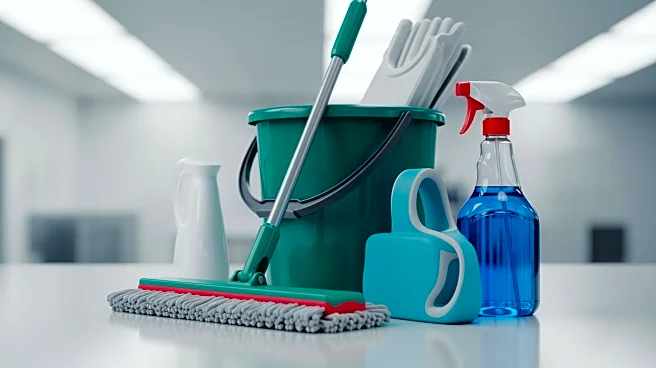What's Happening?
The commercial cleaning industry is experiencing steady growth, projected at a 6.2% compound annual rate through 2028. Despite this growth, many cleaning companies face challenges in recruiting and retaining
skilled workers, with 72% reporting ongoing difficulties. These recruitment challenges disrupt operations and lead to higher training costs and inconsistencies in service quality. To address these issues, facility managers are adopting several strategies to attract, hire, and retain top talent. Key approaches include clear communication of job expectations, competitive compensation and incentives, flexible scheduling options, recognition and professional development, and technology-enabled efficiency. These strategies aim to create a reliable and motivated workforce that meets operational demands effectively.
Why It's Important?
The ability to recruit and retain skilled workers is crucial for maintaining service quality and operational efficiency in the cleaning industry. As demand for cleaning services grows, addressing staffing challenges becomes increasingly important. Implementing effective recruitment and retention strategies can reduce turnover, improve service consistency, and lower training costs. For facility managers, these strategies are not only good HR practices but essential for sustaining high-performing operations. By fostering an environment where employees feel respected and empowered, companies can enhance employee satisfaction and loyalty, ultimately leading to better service outcomes and business success.
What's Next?
Facility managers are expected to continue refining and implementing these strategies to address ongoing recruitment challenges. As the industry evolves, there may be increased adoption of technology-enabled solutions to streamline operations and improve employee experience. Additionally, companies might explore new incentive structures and professional development opportunities to further enhance workforce engagement and retention. Stakeholders, including industry leaders and HR professionals, will likely monitor the effectiveness of these strategies and adapt them to changing market conditions and workforce expectations.
Beyond the Headlines
The focus on improving workforce reliability in the cleaning industry highlights broader trends in employee management and organizational efficiency. Ethical considerations, such as fair compensation and recognition, play a significant role in shaping workplace culture and employee satisfaction. Long-term shifts may include increased emphasis on sustainable practices and technology integration, reflecting broader societal and environmental priorities. As companies invest in their workforce, they contribute to a more stable and resilient industry, capable of adapting to future challenges and opportunities.











